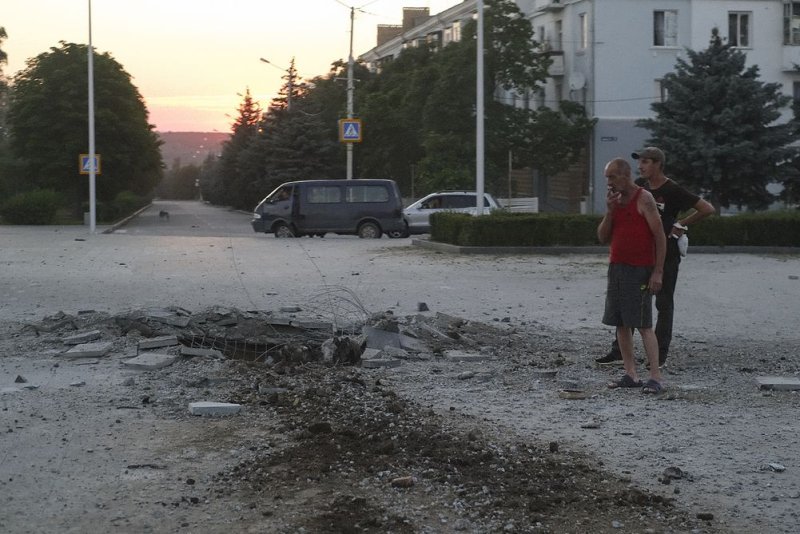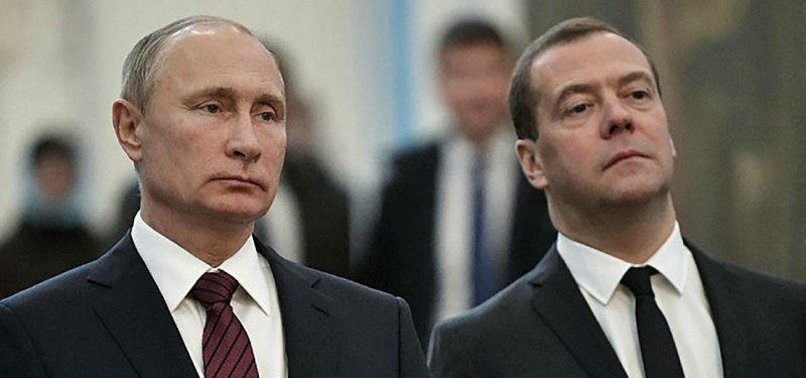By Adam Schrader

Locals at the scene of a crater caused by the downing of a Russian missile by Ukrainian defenders in downtown Kramatorsk in the Donetsk area of Ukraine on Friday.
Photo by George Ivanchenko/EPA-EFE
July 17 (UPI) -- Ukrainian officials said Sunday that its forces still hold two villages in the Luhansk province as a new report raised concerns about human rights abuses in Russia's so-called filtration camps.
Sergiy Haidai, the head of the Luhansk region's military administration, said Sunday that one of the villages has already been captured by Russian forces several times
July 17 (UPI) -- Ukrainian officials said Sunday that its forces still hold two villages in the Luhansk province as a new report raised concerns about human rights abuses in Russia's so-called filtration camps.
Sergiy Haidai, the head of the Luhansk region's military administration, said Sunday that one of the villages has already been captured by Russian forces several times
"But each time our troops pushed the enemy back to their previous positions. However, the enemy does not stop. He returns and suffers another loss," Haidai said in a statement to Telegram.
Haidai said that Russian troops tried to advance toward Verkhnokamianka on Saturday but "received decent resistance, retreated and then lost their personnel."
"There are settlements from which the Russians have already been knocked out several times. They do not stop and suffer losses," Haidai said.
The Donbas region, which comprises the provinces of Luhansk and Donetsk, has been largely held by pro-Russian separatists since Crimea was annexed by Russia in 2014. Russian President Vladimir Putin recognized Luhansk and Donetsk as independent republics before the start of the invasion on Feb. 24.
Haidai said that Russian troops tried to advance toward Verkhnokamianka on Saturday but "received decent resistance, retreated and then lost their personnel."
"There are settlements from which the Russians have already been knocked out several times. They do not stop and suffer losses," Haidai said.
The Donbas region, which comprises the provinces of Luhansk and Donetsk, has been largely held by pro-Russian separatists since Crimea was annexed by Russia in 2014. Russian President Vladimir Putin recognized Luhansk and Donetsk as independent republics before the start of the invasion on Feb. 24.
Experts have said Putin will try to annex the Donbas region into Russia in the coming months.
Earlier this month, Russian forces captured Lysychansk, the last major city in the Luhansk province that had been under Ukrainian control, but Haidai's comments Sunday indicate that Ukrainian forces may be able to hold Russia back from controlling the entire province.
The news came as the Organization for Security and Co-operation in Europe, an international security organization with observer status at the United Nations, released a report Thursday on its ongoing investigation into alleged human rights violations in Ukraine carried out by Russian forces.
The new report found two new "alarming phenomena" in Ukraine including the establishment and use of so-called filtration camps and the tendency of Russian troops to hand over detained people to Russian-backed separatists in the Donbas region, who then impose the death penalty after illegal trials.
The officials found that Russian troops were transporting tens of thousands of civilians to the filtration camps in Russian-held areas of the Donbas region before deporting them to Russia, though could not determine the precise number of people who had been forcibly deported through such camps
"Mass forcible transfers of civilians during a conflict to the territory of the occupying party are prohibited under the 1949 Geneva Conventions," the report noted. "The practice is considered a war crime."
The officials found that around 20 such filtration camps have been established in schools, sports facilities and other locations in eastern Ukraine where they are interrogated and undergo "humiliating body searches" as their personal data is recorded.
Russia also appears to be relying heavily on forced military conscripts from the Donbas region, abducting local men "from the streets, their homes, and their workplaces" to fight against Ukrainian forces, according to the report.
The Institute for the Study of War, a think tank based in Washington, D.C., said in an analysis Saturday that Russia is also stepping up its military recruitment in Russia, which could come at a steep cost to the country well into the future.
The OSCE report, following on the heels of a previous report, also largely confirmed previous findings that large swaths of civilians had been abducted, tortured and killed - including local mayors, journalists and human rights defenders.
The British Defense Ministry, which has been providing intelligence updates since the war broke out, said Sunday that Russia is reinforcing its defensive position in the cities it occupies in southern Ukraine including Mariupol, Zaporizhia, Melitipol and Kherson
"Ukrainian forces have been applying pressure on the Russian defensive line in Kherson Oblast for over a month now," the British Defense Ministry said.
"Recent political statements from both [Ukrainian President Volodymyr] Zelensky and the deputy prime minister have warned of forthcoming offense operations to force Russia out."
A Ukrainian cargo plane crashed in northern Greece late Saturday while carrying "dangerous cargo" from Serbia bound for Bangladesh. Eight people on board were killed.
The Antonov AN-12 plane took off from an airport in Niš and was transporting Serbian-made defense products to the Bangladesh Defense Ministry, the customer, when it crashed near Eleftheroupoli in the Kavala region of Greece, Serbian Defense Minister Nebojša Stefanović said in a statement.
The crash in Greece came around the eighth anniversary of the downing of Malaysia Airlines Flight MH17 and the discovery of the wreckage.
Russia: Attack on Crimea will ignite 'Judgement Day' response
In the event of an attack on Crimea, former president Dmitry Medvedev said in his comments, "Judgment Day will come very fast and hard. It will be very difficult to hide." Medvedev did not elaborate but has previously warned the United States of the dangers of attempting to punish a nuclear power such as Russia over its actions in Ukraine.
Reuters WORLD
Published July 17,2022

The refusal of Ukraine and Western powers to recognise Moscow's control of Crimea poses a "systemic threat" for Russia and any outside attack on the region will prompt a "Judgment Day" response, former president Dmitry Medvedev said on Sunday.
Russia annexed the Black Sea peninsula of Crimea from Ukraine in 2014 after a pro-Moscow president in Kyiv was toppled amid mass street protests. Moscow then also backed pro-Russian armed separatists in the Donbas region of eastern Ukraine.
In the event of an attack on Crimea, Medvedev was quoted by TASS news agency as saying, "Judgment Day will come very fast and hard. It will be very difficult to hide."
Medvedev did not elaborate but has previously warned the United States of the dangers of attempting to punish a nuclear power such as Russia over its actions in Ukraine, saying this could endanger humanity.
His comments were aired a day after a Ukrainian official suggested that Crimea, which most of the world still recognises as part of Ukraine, could be a target for U.S.-made HIMARS missiles, recently deployed by Kyiv as it battles Russian forces.
Earlier on Sunday, Interfax news agency quoted Medvedev as telling World War Two veterans: "If any other state, be it Ukraine or NATO countries, believes that Crimea is not Russian, then this is a systemic threat for us."
"This is a direct and an explicit threat, especially given what had happened to Crimea. Crimea returned to Russia," said Medvedev, who now serves as deputy chairman of the Russian Security Council.
Vadym Skibitskyi, an official at Ukrainian military intelligence, was asked on Saturday in a televised interview if HIMARS could be used on targets in Crimea.
He said Russia had carried out strikes on Ukrainian territory from Crimea and the Black Sea and so these were also justified targets.
Crimea is of particular strategic importance to Russia as it includes the headquarters of its Black Sea fleet at Sevastopol.
In the event of an attack on Crimea, former president Dmitry Medvedev said in his comments, "Judgment Day will come very fast and hard. It will be very difficult to hide." Medvedev did not elaborate but has previously warned the United States of the dangers of attempting to punish a nuclear power such as Russia over its actions in Ukraine.
Reuters WORLD
Published July 17,2022

The refusal of Ukraine and Western powers to recognise Moscow's control of Crimea poses a "systemic threat" for Russia and any outside attack on the region will prompt a "Judgment Day" response, former president Dmitry Medvedev said on Sunday.
Russia annexed the Black Sea peninsula of Crimea from Ukraine in 2014 after a pro-Moscow president in Kyiv was toppled amid mass street protests. Moscow then also backed pro-Russian armed separatists in the Donbas region of eastern Ukraine.
In the event of an attack on Crimea, Medvedev was quoted by TASS news agency as saying, "Judgment Day will come very fast and hard. It will be very difficult to hide."
Medvedev did not elaborate but has previously warned the United States of the dangers of attempting to punish a nuclear power such as Russia over its actions in Ukraine, saying this could endanger humanity.
His comments were aired a day after a Ukrainian official suggested that Crimea, which most of the world still recognises as part of Ukraine, could be a target for U.S.-made HIMARS missiles, recently deployed by Kyiv as it battles Russian forces.
Earlier on Sunday, Interfax news agency quoted Medvedev as telling World War Two veterans: "If any other state, be it Ukraine or NATO countries, believes that Crimea is not Russian, then this is a systemic threat for us."
"This is a direct and an explicit threat, especially given what had happened to Crimea. Crimea returned to Russia," said Medvedev, who now serves as deputy chairman of the Russian Security Council.
Vadym Skibitskyi, an official at Ukrainian military intelligence, was asked on Saturday in a televised interview if HIMARS could be used on targets in Crimea.
He said Russia had carried out strikes on Ukrainian territory from Crimea and the Black Sea and so these were also justified targets.
Crimea is of particular strategic importance to Russia as it includes the headquarters of its Black Sea fleet at Sevastopol.
No comments:
Post a Comment